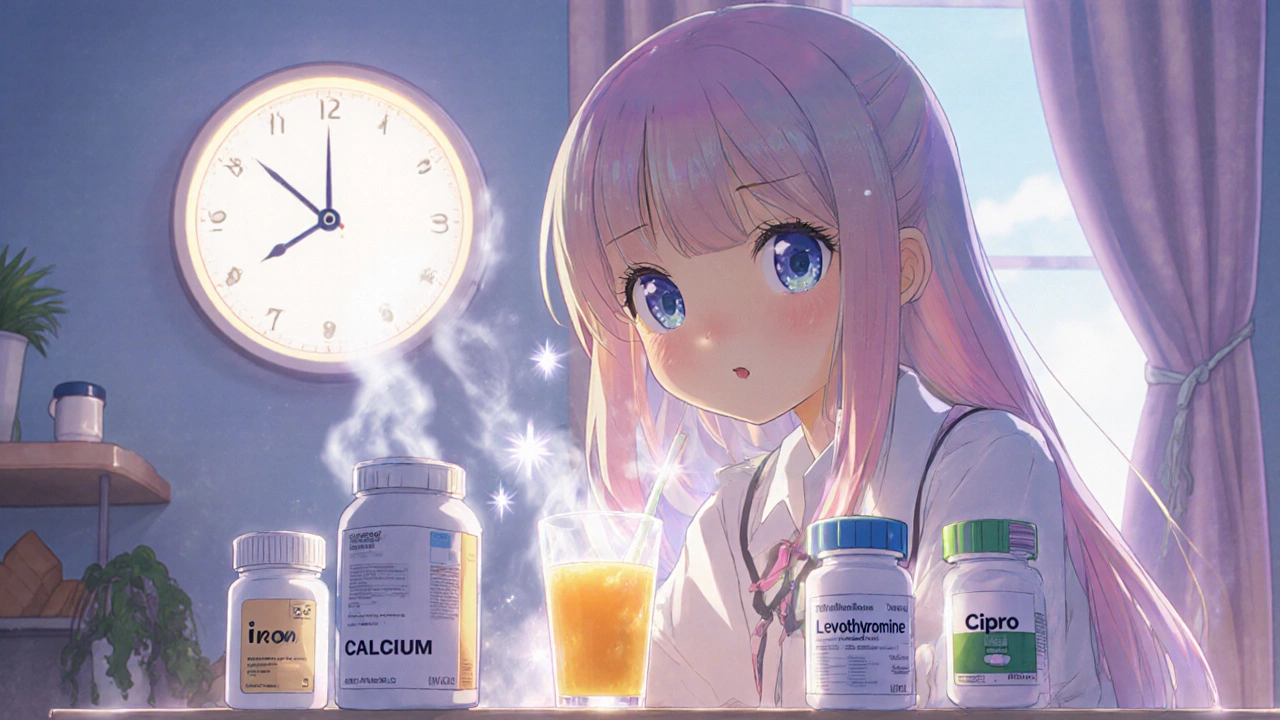Calcium & Iron Absorption Calculator
Many people take calcium and iron supplements while also taking medications, but these can interfere with each other. This calculator helps you determine the optimal timing for your supplements and medications to avoid absorption problems. Based on recommendations from the American Journal of Clinical Nutrition and MedlinePlus Medical Encyclopedia.
Your Supplement & Medication Schedule
It’s common to take calcium and iron supplements - especially if you’re a woman, over 50, or have a condition like anemia or osteoporosis. But here’s the problem: if you’re also taking medication, these supplements might be making your pills useless. Not because they’re bad. But because they’re competing for space in your gut.
Why Calcium and Iron Fight Each Other (and Your Medicines)
Your body doesn’t absorb minerals like calcium and iron the same way it absorbs sugar or protein. They use special transporters in your small intestine - the same ones. When you take calcium and iron together, they fight over who gets in first. The result? Less iron gets absorbed. A 1991 study in the American Journal of Clinical Nutrition found that 600 mg of calcium - about two Tums tablets - cut iron absorption by nearly half. That’s not a small drop. It’s enough to stop you from meeting your daily iron needs, especially if you’re a woman who needs 18 mg a day. Calcium doesn’t just compete - it changes your stomach environment. Calcium carbonate, the most common form in supplements, acts like an antacid. It raises your stomach’s pH, making it less acidic. Iron needs acid to dissolve and be absorbed. No acid? No iron uptake. Even if you take your iron with food, calcium still blocks it. And if you’re on heartburn meds like omeprazole or famotidine? That’s another layer of interference.Antibiotics and Mineral Supplements: A Dangerous Mix
If you’re on antibiotics like ciprofloxacin (Cipro) or doxycycline, taking calcium or iron at the same time can turn your treatment into a waste of money. These antibiotics belong to two classes - fluoroquinolones and tetracyclines - and they bind tightly to calcium, iron, aluminum, and magnesium. When they do, they form a complex your body can’t absorb. You might think you’re getting better, but the drug isn’t even in your bloodstream. Pharmacists see this all the time. A patient comes in saying their infection didn’t clear up. Turns out, they were taking their antibiotic with breakfast - and their calcium pill. The result? The antibiotic doesn’t work. The infection lingers. Then they get another prescription. And another. All because the timing was off. The fix? Don’t take your antibiotic within 2 hours before or after your calcium or iron supplement. For tetracycline antibiotics, some experts recommend waiting up to 4 hours after iron. That’s not just advice - it’s science. The MedlinePlus Medical Encyclopedia confirms this timing is critical for effectiveness.Thyroid Medication and Iron: A Silent Sabotage
If you take levothyroxine for hypothyroidism, you’re already walking a tightrope. This medication needs an empty stomach, first thing in the morning, with water only. But if you take iron or calcium even a few hours later - say, with your mid-morning coffee - you’re blocking the thyroid hormone from being absorbed. University Hospitals Cleveland Medical Center warns that calcium, magnesium, and iron can all reduce levothyroxine levels by up to 30%. That means your TSH levels stay high. You still feel tired. Your weight won’t budge. Your doctor might think you’re noncompliant. But you’re just taking your supplements at the wrong time. The solution? Take your thyroid pill first thing in the morning. Wait at least 4 hours before taking calcium or iron. If that’s not practical, take your thyroid pill at bedtime - but only if your doctor approves it. Some patients find this works better. Just make sure nothing else is in your stomach.
Bisphosphonates and Bone Drugs: Don’t Skip the Window
If you’re on a bisphosphonate like alendronate (Fosamax) for osteoporosis, you’re probably told to take it on an empty stomach with a full glass of water. And you’re told to wait 30 minutes before eating. But what if you also take calcium? That’s where things go wrong. Calcium binds to bisphosphonates and stops them from working. The same goes for iron. These drugs need to be absorbed quickly, and any mineral supplement nearby will interfere. The rule here is simple: take your bisphosphonate in the morning, wait 30 minutes, then wait another 2 hours before taking calcium or iron. If you’re taking both supplements, space them apart by at least 4 hours. Don’t take your calcium pill at night if you’re on this medication - it’s not worth the risk.How to Take Iron Without Stomach Upset
Iron is easiest to absorb on an empty stomach. But for about 40% of people, that causes nausea, cramps, or diarrhea. So what do you do? You can take it with a small amount of food - but avoid dairy, coffee, tea, or whole grains. They block iron too. Instead, pair it with vitamin C. A 200 mg vitamin C tablet or a glass of orange juice can boost iron absorption by up to 300%. That’s a game-changer. It’s why many doctors now recommend taking iron with orange juice or a vitamin C supplement. Also, avoid taking iron with antacids, calcium supplements, or fiber-rich meals. Even a bowl of oatmeal can reduce absorption. Liquid iron can stain your teeth. Use a straw. Rinse your mouth after. If stains stick, baking soda and hydrogen peroxide can help. And yes - black stools are normal. But if they’re tarry or have red streaks, call your doctor. That’s bleeding, not iron.Practical Timing Plan for Daily Supplements
Here’s a real-world schedule that works for most people:- 7:00 AM: Take levothyroxine with water. Wait 30 minutes.
- 8:00 AM: Take iron supplement with vitamin C (orange juice or tablet). Wait 2 hours before eating.
- 10:00 AM: Breakfast (no dairy, no coffee, no calcium).
- 12:00 PM: Lunch (normal meal).
- 3:00 PM: Take any antibiotics (if prescribed), with water only. Wait 2 hours before anything else.
- 6:00 PM: Dinner (can include calcium-rich foods like yogurt or spinach).
- 8:00 PM: Take calcium supplement with dinner. No iron. No thyroid meds.

Who’s at Highest Risk?
Women of childbearing age, pregnant women, and postmenopausal women are most affected. Why? They often take both iron and calcium - iron for blood loss, calcium for bone health. But the studies show that taking calcium with meals makes it nearly impossible to get enough iron. One study of 61 women found that regular calcium use with meals lowered iron absorption so much that many couldn’t meet their daily needs. Older adults on multiple medications are also at risk. If you’re on antibiotics, thyroid meds, or osteoporosis drugs, and you’re popping calcium and iron pills, you’re playing a dangerous game. The interaction isn’t rare. It’s common. And it’s preventable.What About Food Sources?
Don’t panic about food. You don’t need to avoid spinach or dairy forever. The problem is with supplements - concentrated doses taken at the same time as meds. A serving of yogurt with breakfast won’t block your antibiotic if you take it later. But a calcium pill at breakfast? That’s a problem. The same goes for iron-fortified cereal. Eat it. Just don’t take your iron pill with it.When to Call Your Doctor
If you’ve been taking these supplements and meds together for months and you’re still tired, dizzy, or your infection keeps coming back - it’s time to talk. Your doctor can check your iron levels, thyroid function, or antibiotic blood levels. They might adjust your timing, switch your meds, or suggest a different form of supplement. Also, if you’re giving supplements to a child - be extra careful. Iron overdose is the leading cause of fatal poisoning in kids under 6. A single adult iron pill can kill a toddler. Keep bottles locked up. If your child swallows one, call poison control immediately.Can I take calcium and iron together if I space them out?
No - even if you take them hours apart, they can still interfere if taken too close. The best practice is to take iron in the morning on an empty stomach and calcium at night with food, with at least 4 hours between doses. This gives your body time to absorb each mineral without competition.
Does vitamin C help iron absorption even if I take calcium?
Yes, vitamin C still boosts iron absorption - even with calcium in your system. But it won’t fully fix the problem. If calcium is present in high amounts (like from a supplement), it still blocks a significant portion of iron. So take vitamin C with iron, but avoid calcium at the same time.
Can I take iron with coffee or tea?
No. Coffee and tea contain tannins that strongly block iron absorption. Even one cup can reduce absorption by up to 60%. If you take iron, wait at least 2 hours after drinking coffee or tea. Water or orange juice are better choices.
Are liquid iron supplements better than pills?
Liquid iron can be easier to absorb and gentler on the stomach, but it’s not necessarily better. Both forms work the same way in the gut. The main advantage of liquid is that you can adjust the dose. But it can stain teeth - use a straw and rinse after. Pills are more convenient and less messy.
What if I forget and take calcium with my antibiotic?
If you accidentally take them together, don’t panic. One mistake won’t ruin your treatment. But don’t repeat it. Take your next dose as scheduled, with the correct spacing. If you’re on a short course (like 7 days), you might be fine. But if it’s a long-term antibiotic or you have a serious infection, talk to your doctor - they may want to check if the drug levels are low.
Do all calcium supplements block iron the same way?
Calcium carbonate blocks iron more than calcium citrate because it’s more alkaline and raises stomach pH. But both forms reduce iron absorption when taken together. Calcium citrate is gentler on the stomach, but it still competes with iron. The best approach is timing - not choosing one over the other.
Can I take iron and calcium on alternate days?
Yes - alternating days is a safe and effective strategy. Take iron on Monday, Wednesday, Friday. Take calcium on Tuesday, Thursday, Saturday. Sunday off. This avoids competition entirely and gives your body time to absorb each mineral fully. Many doctors recommend this for patients who need both.


King Over
November 20, 2025 AT 04:56Just took my iron with coffee this morning. Guess I'm doing it wrong. 😅
Michael Fessler
November 21, 2025 AT 04:00As a pharmacist, I see this ALL the time. Patient comes in with low ferritin, takes calcium at breakfast with their levothyroxine, wonders why their TSH is still 8.5. The science is rock solid-timing isn't optional. Calcium carbonate = antacid. Iron needs acid. End of story. Also, vitamin C helps, but only if calcium isn't in the same GI tract. 2-hour buffer is the bare minimum. Some of us wait 4. Better safe than anemic.
Ravinder Singh
November 23, 2025 AT 01:49Bro, I used to take iron and calcium together because I'm lazy. Then I got dizzy all day, felt like a zombie, and my doctor said my ferritin was 12. Changed my routine: iron at 7am with OJ, calcium at 8pm with dinner. My energy came back like magic. Also, liquid iron with a straw saved my teeth. Don't be like me before. You got this. 💪
Russ Bergeman
November 24, 2025 AT 06:18Wait-so you’re telling me I’ve been taking my antibiotics with my Tums for 3 years? And now my UTIs keep coming back? Oh. My. God. I’m so stupid. I’m literally the reason antibiotics are failing. I’m a walking public health crisis. 😭
Johannah Lavin
November 25, 2025 AT 00:16YAS. This is the kind of post I need to save and re-read every month. I’m 52, on levothyroxine, iron, and calcium, and I’ve been feeling like a ghost. This schedule? I’m trying it tomorrow. Also, thank you for mentioning the black stools thing-so many people panic and think they’re bleeding. 🫶
Jeremy Samuel
November 26, 2025 AT 13:19alternating days is dumb. why not just take iron citrate and calcium citrate together? theyre both chelated so they dont fight. i read it on a forum. its science.
daniel lopez
November 27, 2025 AT 22:11THIS IS A PHARMA LIE. Calcium and iron don’t compete. The FDA and Big Pharma want you to buy more pills and take them at different times so you’ll need MORE supplements. The real issue? Your gut is clogged with toxins from processed food. Take a probiotic. Drink apple cider vinegar. Stop listening to ‘experts.’ The body knows what to do. You’re being manipulated.
Katie Magnus
November 29, 2025 AT 02:45Ugh. So basically, if I want to live, I can’t eat yogurt? Or drink tea? Or take a single pill without a PhD in pharmacology? This is why I hate being a woman. Everything is a minefield. I’m just gonna die early and save myself the stress.
Nosipho Mbambo
November 29, 2025 AT 04:30...I read this. And I'm... not sure I believe any of it. Like, maybe. But also, maybe it's just... a lot? I mean, I take my iron with dinner. And my calcium. And my blood pressure med. And I'm fine? Maybe I'm just lucky? Or maybe... it's all overblown?
Destiny Annamaria
November 30, 2025 AT 17:53As a Nigerian-American, I grew up with iron-rich jollof rice and calcium-rich ogi. No supplements needed. But now I’m in the US, on meds, and suddenly I’m told I can’t eat my culture? I’m just gonna eat my food and take my pills at midnight. Let the science sort itself out. 🌍❤️
Ron and Gill Day
December 2, 2025 AT 03:28Wow. This post is so basic. I’ve been a doctor for 20 years. The real issue? People don’t read the damn pill inserts. And now we have Reddit ‘experts’ writing 2000-word essays on mineral absorption. The solution? Stop taking supplements unless you have a diagnosed deficiency. Done. You’re welcome.
Dana Oralkhan
December 3, 2025 AT 11:52Thank you for writing this. I’m a nurse and I’ve seen too many patients with low iron because they took their calcium with breakfast. I’ve started printing this schedule and handing it out. One woman cried because she finally understood why she was so tired for 5 years. You saved her. You saved us all.